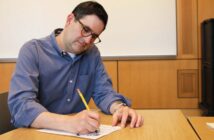It’s almost midnight on “Thirsty Thursday,” and I am sitting in a Lehigh police vehicle.
Sergeant Chris Houtz of the Lehigh University Police Department is in the front seat driving past East Fifth Street as I watch hordes of students dressed in all kinds of themes stumble to their next party.
One student waves a finger as we drive, not realizing that I can see his gesture before he staggers away giggling. Other voices quiet as we pass, some heads lower as we pause and every doorman sits up just a bit straighter whenever we stop. My friends and peers suddenly became wide-eyed deer staring at headlights the second they see our police car approaching.
I am only an observer in this process, but I have never felt so ostracized in my life.
When I was younger, I was always taught that the police were society’s saving grace. If my toddler-self was ever in deep trouble — like separated from my mother somewhere in the third floor aisles of Macy’s at the mall — a police officer could always help me. “They’re the good guys,” my mother would tell me.
But if they’re the good guys, why are they portrayed as villains 15 years later? Why did I, simply riding with Sgt. Houtz to write about him and the LUPD, feel the slight need to duck my head every time someone I knew passed?
Lehigh’s police have a perpetual stigma attached to their name. Although there’s a man or a woman with complex feelings and emotions behind every uniform, we can’t seem to see past the notion that they are the law.
But the truth is, they’re so much more than just enforcing the law.
Take Sgt. Houtz for instance. Born and raised nearby in Catasauqua, Pennsylvania, he absolutely loves the outdoors. His favorite place is South Carolina and if he could hunt, fish, camp or lodge there for the rest of his life, he absolutely would.
Sgt. Houtz also listens to Everclear and 3 Doors Down. He’s an avid Penn State University football fan — taking after his father who, as a child, used to sneak under the fence to attend the games — and loves to eat at his favorite Italian restaurant A Ca Mia.
But what Sgt. Houtz really loves is being a sergeant in the Lehigh University Police Department.
“I actually started in emergency services at 14 years old,” he told me during a meeting prior to my East Fifth ride-along. “I joined the fire department and from there, it was just a natural progression for me. I’ve always enjoyed helping people.”
He’s been with LUPD for 15 years after completing a 700 hour Police Academy program. If you thought your classes were tough or dry, try going through a 1,000 page vehicle code manual section by section for two weeks straight at the academy. It’s a tough business.
But as Sgt. Houtz and I continued our conversation, and I got to know him better, I realized that we’ve really framed this negative image of the LUPD by constantly demonizing the very people trying to protect us.
He understood that as well. “We really are more than just arresting people,” he said. “We are approachable but this is our job — this is what we have to do. We’re here to make everything safer for people. Some students get it and some just can’t seem to see past the ‘you’re just here to bust up our party’ type of thing.”
It started to make sense to me, especially when he explained how his main concern is usually for the people living around this institution that don’t go to Lehigh.
“These residents shouldn’t have to put up with guys urinating alongside their house at midnight,” he said. “They shouldn’t have to wake up the next morning with garbage cans knocked over and Solo cups all over their yard, driveway, street and sidewalk. They just shouldn’t have to deal with that.”
So what advice he would give to the students throwing those parties? “It all comes down to responsibility,” he said. “Take care of what you’re doing and control your own party. Don’t turn it into 400 people in a yard where you know there’s absolutely no way to control it.”
When we’re busy painting all of LUPD with a broad brush stroke of austerity, we actually miss their true purpose. As much as people scoff at their presence, they are always on call and ready to come help at a moment’s notice. We appreciated their efforts during the gunman threat last week, but why don’t we feel that same way when they’re patrolling the streets later at night?
We have to see past the uniform. It doesn’t have to be a Jekyll and Hyde syndrome where these men and women become unapproachable robots the second they put a uniform on.
Instead, they can be good people like Sgt. Houtz who can sit in an office and show me amazing pictures he’s taken in the Poconos of a baby bear named Big Red. They can be good people who can tell me that they’ll always talk nicely to someone even if that person is spitting in their face. They can be good people who will eagerly take the time to show me the entire official fingerprinting procedure as well as giving me a guided tour of their station.
They can be — and are — good people.
“I’ve had students who I’ve arrested come back for alumni meetings and make sure they come over to say hello,” Sgt. Houtz said at the end of our meeting. “Even after I’ve arrested them. They understand that I’m just doing my job.”






Comment policy
Comments posted to The Brown and White website are reviewed by a moderator before being approved. Incendiary speech or harassing language, including comments targeted at individuals, may be deemed unacceptable and not published. Spam and other soliciting will also be declined.
The Brown and White also reserves the right to not publish entirely anonymous comments.
5 Comments
A great article on Sgt Houtz definitely a great person
Very nice article.
Of course, one of the problems is that in college it’s hard to perceive that you’re not fully grown up yet and that by doing things you perceive as “grown up”, such as getting drunk, you’re actually proving it. But don’t worry about it unless you let it get out of hand, because all of us have also gone through that stage before.
Real adults like Sgt Houlz are there to protect you from yourselves and from the evil that really exists in the world. Learning that is part of your education, but one you actually only will perceive a few years from now.
Being a college policeman takes a special talent of balancing letting you learn and also ensuring that no one or property gets harmed. Your article may help some of you get that part of your education a bit sooner.
Gary Wilson, ’72, P ’08
Well done thanks Chris Houtz for your service
Nice job Howie…stay safe out there
Nice article! Chris is very good man who I am proud to call a good friend!